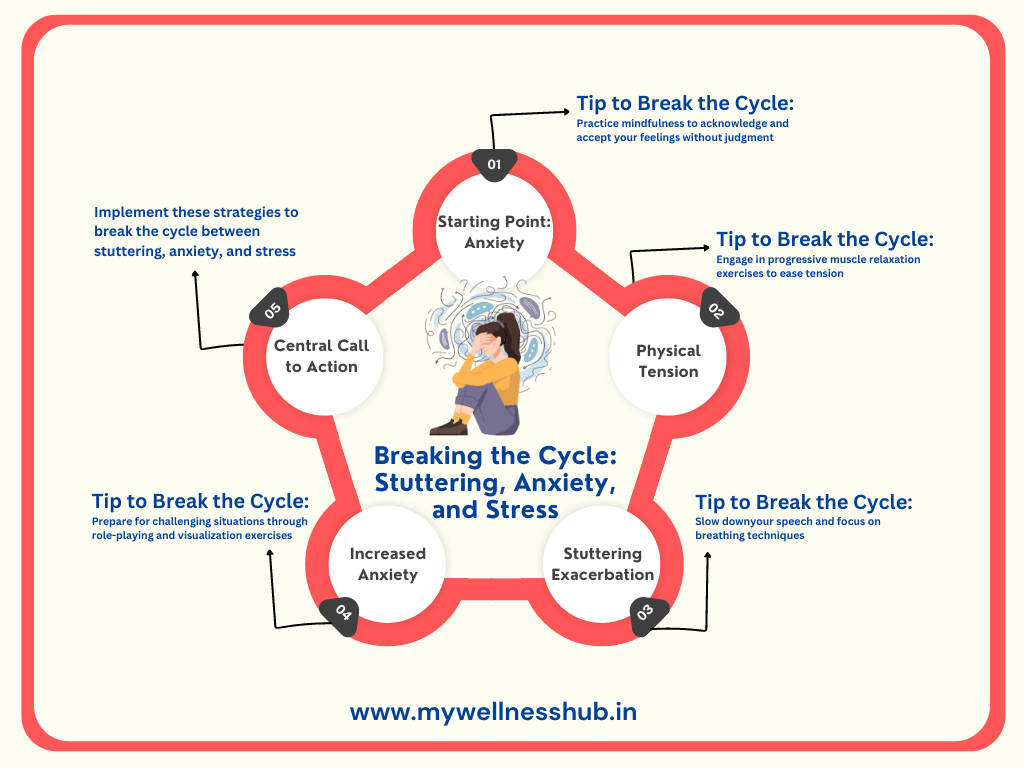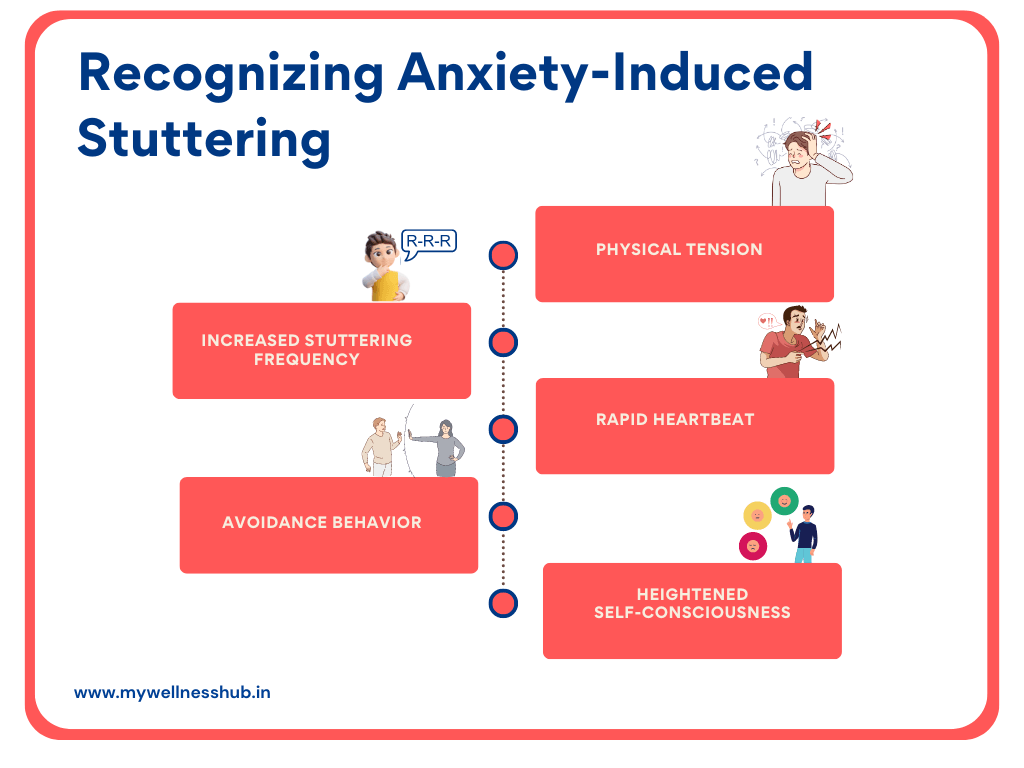Overcoming Stuttering: Impact of Anxiety and Stress on Stuttering
By Rajini D
Last Updated: April 5, 2024
In our exploration of the connections between anxiety, stress, and stuttering, we’ve highlighted essential strategies to manage these challenges effectively. Building a support network and using tailored communication skills are crucial steps towards embracing your unique voice with confidence. Wellness Hub remains committed to supporting you every step of the way. As you continue on this journey, remember that your experiences are valuable and transformative. Together, let’s advance in understanding and overcoming stuttering, fostering a more inclusive and compassionate world. Keep moving forward—one word at a time—with courage and hope.

Unraveling the Connection Between Stuttering, Anxiety, and Stress
What Exactly Is Stuttering?
Stuttering is when someone finds it hard to speak smoothly. They might repeat sounds, parts of words, or whole words, stretch out sounds or stop talking mid-sentence. How often and how badly someone stutters can be different for each person. This can make talking to others hard and might make someone feel embarrassed or upset.
There are mainly two types of stuttering:
- Developmental Stuttering: This is the most common form and usually starts in early childhood when speech and language skills are developing rapidly. Most children outgrow this phase, but for some, stuttering can persist into adulthood.
- Neurogenic Stuttering: This type can occur after a stroke, head trauma, or other types of brain injuries and is less common. It happens because the brain has difficulty coordinating the different components involved in speech.
Understanding these distinctions is crucial as they play a role in how we approach the impact of anxiety and stress on stuttering.
Read more: Neurogenic vs. Psychogenic Stuttering: Key Differences Explained.
Comparison of Developmental and Neurogenic Stuttering
| Feature | Developmental Stuttering | Neurogenic Stuttering |
|---|---|---|
| Age of Onset | Early Childhood (2-5 years): Most common period for onset, aligning with significant language development stages. | Post-Neurological Event (Any Age): Onset can occur at any age following events that impact brain functions related to speech. |
| Causes | Genetic and Developmental Factors: A combination of genetic predispositions and the complexities of language acquisition. Environmental factors and family history may also play roles. | Brain Injuries or Diseases: Caused by disruptions in neural pathways due to strokes, traumatic brain injuries, or neurological diseases affecting speech coordination. |
| Symptoms | Repetitions, Prolongations, Blocks: Characterized by repeating sounds, prolonging sounds, and involuntary pauses. Severity can vary widely. | Disrupted Speech Coordination: Similar stuttering symptoms as developmental, but often accompanied by other neurological symptoms. |
| Treatment | Speech Therapy and Support: Focuses on techniques to improve fluency, reduce stuttering episodes, and manage psychological impacts. Participation in support groups can provide emotional and social support. | Speech Therapy and Neurological Care: In addition to speech therapy, treatment may include medications or other interventions to address the underlying neurological condition. |
The Influence of Anxiety and Stress on Stuttering
Anxiety and stress are not just fleeting moments of discomfort; they are profound experiences that can affect every part of our being, including how we speak. For those who stutter, anxiety and stress can turn a manageable situation into a challenging ordeal. Here’s how:
- Physiological Response: When we’re stressed or anxious, our body goes into a ‘fight or flight’ mode, releasing cortisol and adrenaline. These hormones prepare our body to respond to a threat but also cause physical symptoms like muscle tension, including in the speech muscles. This tension can exacerbate stuttering, making it harder to speak fluently.
- Psychological Impact: Anxiety, particularly social anxiety, can heighten self-awareness and fear of judgment, increasing the pressure to speak without stuttering. This pressure, ironically, can make stuttering more pronounced. It’s a vicious cycle: fear of stuttering increases anxiety, which in turn, makes stuttering more likely.
Read more about our article Types of Anxiety Disorders and their Symptoms.
Navigating Through the Storm: Identifying Triggers and Symptoms
Recognizing Anxiety-Induced Stuttering
Understanding the signals of anxiety-induced stuttering is like learning to read the weather before a storm—it’s about noticing the signs early to prepare and respond effectively. Anxiety and stress manifest in various ways, influencing speech patterns and exacerbating stuttering. Here are some telltale signs that anxiety might be affecting your speech:
- More Stuttering: You might stutter more when you’re stressed or worried.
- Feeling Tight: Your throat or chest might feel tight before you talk, which makes it hard to speak easily.
- Avoiding Talking: You may avoid certain words or situations because you’re afraid you’ll stutter.
- Fast Heartbeat and Breathing: Feeling nervous can make your heart beat faster and your breathing quick, which can make stuttering worse.
- Worrying a Lot About Talking: If you’re really worried about stuttering, it can actually make it harder to speak smoothly.

Acknowledging these signs is the first step towards managing the impact of anxiety on stuttering. With awareness comes the power to seek strategies and supports that can help ease the stress and reduce stuttering episodes.
The Vicious Cycle of Anxiety and Stuttering
Stuttering and anxiety often create a feedback loop, each intensifying the other. This cycle can feel like being caught in a whirlpool, where the more you struggle, the harder it is to break free. Here’s how this cycle typically unfolds:
- The Fear of Stuttering: It starts with a fear of stuttering in specific situations, which can spike anxiety levels.
- Increased Anxiety: As anxiety levels rise, the body’s fight or flight response kicks in, tightening muscles necessary for speech and making stuttering more likely.
- Stuttering Occurs: The physical and emotional responses to anxiety contribute to a stuttering episode.
- Negative Reactions and Perceptions: Experiencing stuttering, especially if it leads to negative reactions from others or reinforces negative self-perceptions, can heighten feelings of embarrassment or shame.
- Avoidance and Increased Fear: To escape these negative feelings, you might start avoiding situations where you have to speak, further limiting your experiences and increasing the fear of stuttering.
Breaking this cycle involves understanding both the emotional and physical aspects of stuttering and anxiety. Techniques and therapies aimed at managing stress, improving self-esteem, and directly addressing stuttering can provide a lifeline for those caught in this cycle.
Tools for Triumph: Practical Strategies for Managing Anxiety and Stuttering
Stress Management Techniques
Stress and anxiety are not just mental states; they manifest physically, particularly in situations that might trigger stuttering. Incorporating stress management techniques into your daily routine can offer significant relief and improve your overall well-being.
- Breathing Exercises: Simple yet powerful, focused breathing can help calm your nervous system. Try the 4-7-8 technique: inhale for 4 seconds, hold your breath for 7 seconds, and exhale slowly for 8 seconds. This practice can be especially helpful before or during situations known to induce stress.
- Relaxation Techniques: Progressive muscle relaxation, where you tense and then gradually relax different muscle groups, can reduce physical tension associated with anxiety. Practicing this technique can help ease the muscle tightness that contributes to stuttering.
- Physical Activity: Regular exercise, whether it’s a brisk walk, a yoga session, or any form of physical activity you enjoy, can significantly lower stress levels. Physical activity releases endorphins, the body’s natural stress relievers, and can improve your mood and decrease feelings of anxiety.
Incorporating these techniques into your routine can create a foundation of calmness and stability, reducing the overall impact of stress and anxiety on your life and, consequently, on your speech.
Know more about 7 Key Techniques for Overcoming Stuttering
Improving Communication Skills
Enhancing your communication skills goes hand in hand with managing stress and anxiety, offering a twofold benefit: reducing the incidence of stuttering and increasing your confidence in social situations.
- Slow Down: Rushing through your words increases pressure and tension. Practice slowing down your speech rate and giving yourself permission to take your time. Pausing before you speak can also help you feel more in control.
- Practice Mindfulness: Being present in the moment can reduce anxiety and improve your focus on communication. Mindfulness exercises can help you become more aware of your speech patterns and identify triggers in a non-judgmental way.
- Seek Professional Guidance: Working with a speech therapist can provide you with personalized strategies to improve fluency. Speech therapy might include techniques to control your breathing, pace your speech, and manage stuttering in stressful situations.
- Prepare and Practice: Anticipate situations where you might feel anxious and prepare responses in advance. Practicing in a safe environment, whether alone or with a trusted friend or family member, can build your confidence.
Detailed Overview of Stress Management Techniques and Their Benefits
| Technique | Description | Benefits |
|---|---|---|
| Breathing Exercises | Controlled breathing involves focusing on slow, deep breaths to engage the body’s natural relaxation response. Techniques include the 4-7-8 method, diaphragmatic breathing, and box breathing. | – Lowers Heart Rate: Creates a calm state by reducing the heart rate, aiding in relaxation. – Reduces Muscle Tension: Eases physical stress symptoms, potentially decreasing stuttering severity. |
| Relaxation Techniques | Encompasses a range of practices including progressive muscle relaxation (tensing and relaxing muscle groups in sequence) and meditation (focusing the mind on achieve a state of calm). | – Decreases Overall Stress: Significantly lowers stress levels, promoting a sense of well-being. – Improves Speech Fluency: By reducing tension, these techniques can help enhance fluency in individuals who stutter. |
| Physical Activity | Involves engaging in regular, moderate exercise such as walking, yoga, swimming, or any physical activity that increases heart rate and stimulates endorphin production. | – Releases Endorphins: Natural chemicals in the body that act as mood elevators and painkillers, improving overall mood. – Enhances Physical and Mental Health: Regular activity improves cardiovascular health, boosts energy levels, and can reduce the impact of stress on speech. |
Know more: How Anxiety Can Cause Stuttering
The Strength of Togetherness: Building a Support System
The power of community and the support of family and friends play a pivotal role in navigating these waters, offering a beacon of hope and a network of understanding.
The Importance of Community
In the labyrinth of life, facing stuttering and anxiety can sometimes lead to feelings of isolation. But there’s a world of understanding and empathy waiting in support groups and communities, both online and in-person, where experiences and stories are shared.
- Support Groups: Joining a support group for people who stutter offers a unique space where your experiences are not just heard but deeply understood. Such groups provide not only solace but also practical advice and strategies that others have found helpful.
- Sharing Experiences: Sharing your journey with others who stutter can significantly reduce feelings of loneliness and isolation. It fosters a sense of belonging, reminding you that you are not alone in your challenges.
These spaces of shared experiences become pillars of strength, where the collective wisdom and empathy of the community serve as a guiding light, helping alleviate the weight of anxiety and the struggles of stuttering.
How Family and Friends Can Help
The role of family and friends in supporting someone who stutters is invaluable. Their understanding, patience, and encouragement can make a significant difference in the journey towards managing stuttering and reducing anxiety.
- Listen Patiently: Offering your time and attention and listening without rushing or finishing sentences can make the person feel valued and understood.
- Avoid Unsolicited Advice: Well-meaning advice like “just slow down” or “take a deep breath” can sometimes feel dismissive. Instead, ask how you can support them or what they find helpful during challenging moments.
- Encourage Open Communication: Create a supportive environment where feelings and experiences related to stuttering can be shared openly, without fear of judgment.
- Educate Yourself: Learning more about stuttering can help you understand the challenges faced and the best ways to support your loved one. Wellness Hub offers resources and articles that can deepen your understanding and equip you with the knowledge to be an even stronger pillar of support.
Conclusion
In our exploration of the connections between anxiety, stress, and stuttering, we’ve highlighted essential strategies to manage these challenges effectively. Building a support network and using tailored communication skills are crucial steps towards embracing your unique voice with confidence. Wellness Hub remains committed to supporting you every step of the way. As you continue on this journey, remember that your experiences are valuable and transformative. Together, let’s advance in understanding and overcoming stuttering, fostering a more inclusive and compassionate world. Keep moving forward—one word at a time—with courage and hope.
Frequently Asked Questions:
1. Can anxiety and stress cause stuttering?
Anxiety and stress cannot directly cause stuttering, but they can significantly exacerbate it. Individuals who stutter may experience increased stuttering during periods of high stress or anxiety due to physical tension and heightened emotional responses.
2. What are some effective strategies for managing stuttering related to anxiety?
Effective strategies include practicing stress management techniques such as breathing exercises and relaxation techniques, engaging in regular physical activity, improving communication skills through speech therapy, and seeking support from groups or professionals.
3. How can I tell if my stuttering is affected by anxiety?
Signs that your stuttering may be influenced by anxiety include increased frequency of stuttering episodes during stressful situations, physical tension while speaking, rapid heartbeat, avoidance of speaking situations, and heightened self-consciousness about stuttering.
4. Can joining a support group help manage stuttering?
Yes, joining a support group can be incredibly beneficial. Support groups provide a sense of community, reduce feelings of isolation, and offer practical advice and coping strategies shared by individuals with similar experiences.
5. How can family and friends support someone who stutters?
Family and friends can support someone who stutters by listening patiently, avoiding unsolicited advice, encouraging open communication about feelings and experiences, and educating themselves about stuttering to better understand and support their loved one.
6. Are there any professional treatments for stuttering?
Speech therapy is a highly effective treatment for stuttering, offering techniques to improve fluency and communication skills. Cognitive-behavioral therapy (CBT) can also be beneficial, particularly for addressing the anxiety aspects related to stuttering.
7. Is it possible to overcome stuttering completely?
While some people may outgrow stuttering, particularly if it begins in childhood, others may experience it throughout their lives. However, with the right strategies and support, individuals can significantly improve their fluency and confidence in speaking.
8. What is the difference between developmental stuttering and neurogenic stuttering?
Developmental stuttering is the most common type of stuttering that typically begins in early childhood during the development of speech and language abilities. It is often outgrown, but for some, it can persist into adulthood. Neurogenic stuttering, on the other hand, occurs after a stroke, head injury, or other neurological conditions and is characterized by disruptions in the brain’s ability to coordinate the muscles and movements needed for speech.
9. Can lifestyle changes reduce the impact of anxiety on stuttering?
Yes, certain lifestyle changes can help reduce the impact of anxiety on stuttering. Regular physical exercise, maintaining a healthy diet, ensuring adequate sleep, and practicing mindfulness or meditation can all contribute to lowering stress levels, which in turn can help reduce anxiety-induced stuttering episodes.
10. How can technology assist in managing stuttering?
Technology offers several tools and applications designed to assist individuals who stutter. From speech therapy apps that provide exercises and feedback to devices that enhance fluency through auditory feedback or delayed auditory feedback, technology can be a valuable component in managing stuttering. Additionally, online platforms and virtual support groups provide accessible resources and communities for individuals seeking support and advice.
About the Author:
Rajini Darugupally
M.Sc., Speech-Language Pathologist (9+ years of experience)
Rajini is a passionate and dedicated Speech-Language Pathologist with over 9+ years of experience, specializing in both developmental speech and language disorders in children and rehabilitation in adults. Driven by a desire to empower each individual to find their voice, Rajini brings a wealth of experience and a warm, genuine approach to therapy. Currently, at Wellness Hub, she thrives in a team environment that values innovation, compassion, and achieving results for their clients.
Book your Free Consultation Today
Parent/Caregiver Info:
Client’s Details:
* Error Message








